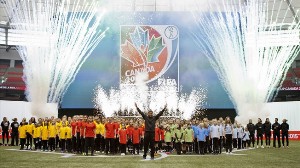 Attending the Symposium on women’s football organised by FIFA in Vancouver, Canada, as part of the FIFA Women’s World Cup, and hearing lots of presentations and interventions by speakers who extol the virtues of the woman, and the need for the world to pay more attention to the women’s game.
Attending the Symposium on women’s football organised by FIFA in Vancouver, Canada, as part of the FIFA Women’s World Cup, and hearing lots of presentations and interventions by speakers who extol the virtues of the woman, and the need for the world to pay more attention to the women’s game.
Quite a lot of fighting talk for various speakers, as I am witnessing ladies who have excelled in football worldwide – Americans, Swedes, Germans and many others speaking about how they are coping with the challenges. FIFA’s role has been accentuated and praised for how it is helping football to grow on the women’s side.
Americans and Canadians are doing well from the women’s game. Germany is also a successful female football nation. And we all saw the exploits of England, and how them getting so close to reaching the finals has done lots to the public awareness of the game.
From the big presentations came a strong and moving intervention by my good friend; someone I have grown to admire so much, Sierra Leone Football Association President Isha Johansen (by the way, terribly sorry for Isha’s loss – the needless loss of the life of her brother back in Sierra Leone which must have been very hard to cope with for her, being here in Canada and having the courage to continue her work in spite of this tragedy).
Isha spoke about the challenges of women’s football in Africa, which differs from the level of challenges of the game in the west. She drew our attention to the societal challenges, the expectations on our women in Africa, and how agriculture and the help our girls can give to their families take priority over education, never mind sports.
Isha painted a picture of a continent that needs a lot more from the society, from the mindset, from home, from the encouragement of men, to grow female football in Africa.
And it is a unanimous view that engaging our girls using sport, particularly football, can not but be a positive thing for the overall sanctity of the game of football, and by extension, the African society.
Isha talked about a new project that she is working on, “Power Play” which she used the platform to seek, and received the support of the general house for. “Power Play” is a project that seeks to empower the women and girls of Africa, through football.
This brings me to my main concern. Africans are attending this symposium and I am sure they are watching and many wondering “where do we start from?”
Problem is that, if most parts of the world like the west, Australia, the U.S. and others like that see themselves as being at ground zero, then Africa is still in the basement. And we need to make a swift transition from basement (sub zero) to level zero where their counterparts are now, to catch up first, before we can strive to grow in commensurate levels as these big players in women’s football.
And I am hoping that Power Play, in conjunction and cooperation with the programmes that yours truly is putting together through ‘Soccer Belles’ (please have a look at www.africans-abroad.org/soccer-belles for background information), will serve a purpose in promoting football amongst our girls and women.
This Vancouver forum focuses a lot on the player side of women’s football, as well as the assistance that can be afforded for former players to step up to become coaches and referees. It focused on competition and how women’s football can be exciting. And also, according to my African sister, Burundian Lydia Nsekera, how to encourage women to feel free to stand for election to get into governance of the game of football in various countries.
But what happens to the girls who can have a lot to offer to the sport but perhaps are not politically powerful, nor are good football players?
There are many young girls and ladies who want to be involved in sport, many who want to be involved in football, but do not have the raw talent or physical build to become players, from which they, in the present dispensation, can step up to become coaches and referees. What can we do with them?
Encouraging all manner of ladies to be actors in whatever way in women’s football, be they as players, career coaches, or administrators, organisers and public relations experts, will be a step in the right direction for the African women’s game.
It will be nice to have a scenario where females get a chance to be in football, and get a chance to grow their sport, not as a charity case but rather as a separate industry that is worthy of whatever accolade that they receive.
Watching the Women’s World Cup in Canada, one thing struck me. Referees had less whistle-blowing to do than in the men’s game. There were no scuffles, no fights, and no u essay rolling round on the floor from the slightest touch by an opponent. The girls just got on with it.
Real credit to the women’s game. I hope we the men can assist and encourage and do what we can to empower these ladies and make football a truly universal sport, a truly universal institution that cuts across every sphere and breaks all barriers of gender, race and inequality in general.
I rest….for now.
